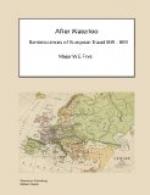Lausanne is an irregularly built city, and not very agreeable to pedestrians, for its continual steep ascents and descents make it extremely fatiguing, and there is a part of the town to which you ascend by a flight of stairs; the houses in Lausanne have been humorously enough compared to musical notes. The country in the environs is beautiful beyond description and has at all times elicited the admiration of travellers. There is an agreeable promenade just outside the town, on the left hand side of the road which leads to Geneva, called Montbenon, which is the fashionable promenade and commands a fine view of the lake. On the left hand side is a Casino and garden used for the tir de l’arc, of which the Vaudois, in common with the other Helvetic people, are extremely fond. On the right hand side of the road is a deep ravine planted in the style of an English garden, with serpentine gravel walks, and on the other side of the ravine stands the upper part of the city, the Cathedral, Hotel de Ville, and the Chateau du Bailli, which is the seat of Government. From the terrace of the Cathedral you enjoy a fine view, but a still finer and far more comprehensive one is from the Signal house, or Belvedere near the forest of Sauvabelin (Silva Bellonae in Pagan times)[57]. In this wood fairs, dances and other public festivals are held, and it is the favourite spot for parties of pleasure to dine al fresco; it is a pity, however, that the edifice called the Belvedere was not conceived in a better taste; it has an uncouth and barbarous appearance.
Lausanne is situated about a quarter of a mile (in a right line) from the lake, and you descend continually in going from the city to the Lake Leman by a good carriage road, until you arrive on the borders of the lake, where stands a neat little town called Ouchy, or as it is sometimes termed le port de Lausanne. There is a good quai and pier. The passage across the lake from Ouchy to the Savoy side requires four hours with oars.
I have made several pleasant acquaintances here, viz., M. Pidon the Landamman, a litterato of the first order; Genl La Harpe, the tutor of the Emperor of Russia; but the most agreeable of all is the Baron de F[alkenskiold], an old gentleman of whose talents, merits and delightful disposition I cannot speak too highly. He has the most liberal and enlightened views and opinions, and is extremely well versed in English, French and German litterature. He is a Dane by birth and was exiled early in life from his own country, on account of an accusation of being implicated in the affair of Struensee; and it is generally supposed that he was one of Queen Matilda’s favoured lovers, which supposition is not improbable, as in his youth, to judge from his present dignified and majestic appearance, he must have been an uncommonly handsome man. He has lived ever since at Lausanne, and tho’ near seventy-four years of age and tormented with




